If you want to live in South America but don’t want that much “spice” in your life, living in Chile as an expat is your best bet.
Chile is a Latin American country. It’s one of the region’s safest, most organized, and most economically stable. However, it’s most certainly very different from your home country, so prepare for a certain amount of culture shock.
In this guide, we will cover all the essential information you need to know to move and settle down in Chile.
In this guide:
- Chile overview: what the country is like
- The legalities of moving to Chile: visas and residency options.
- The cost of living: monthly expenses, rentals, and real estate.
- Chile as a retirement destination.
- Infrastructure: travel connections, public transport, internet.
- Buying real estate.
- Healthcare and education.
- Where to live in Chile – an overview of the most popular expat locations.
- The pros and cons of living in Chile.
Chile overview
If you keep your mind open, Chile will be a great place to live. As the culture and lifestyle in Chile are so unique, it is easy to complain about many things. Instead, be flexible and focus on the possibilities Chile is offering.
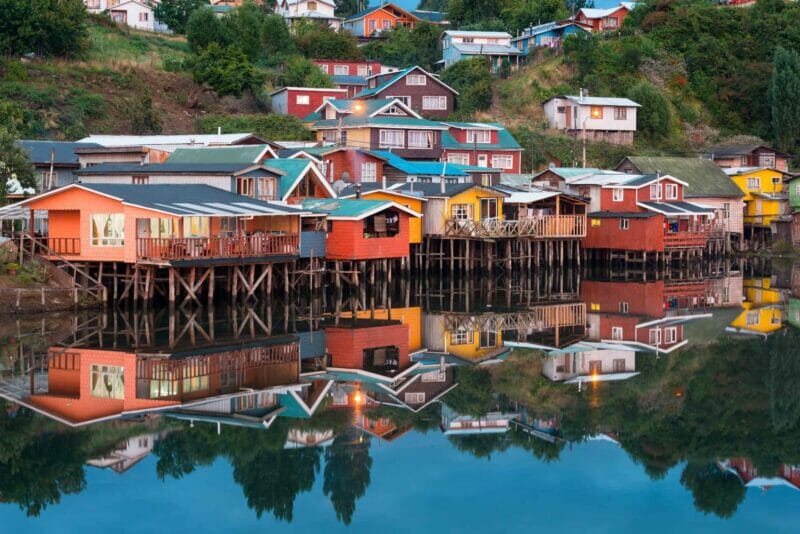
Setting up a business is easy: Chile is a land of opportunities, and taking advantage of them can be very easy.
It is an excellent place for entrepreneurs. There are few barriers to starting a business, and bureaucracy is surprisingly low. You will find many exciting coworking spaces with people from all around the world. The Chilean government has several programs to encourage entrepreneurship and innovation.
Varied climate: If you are a summer person, the climate will suit you. It is warm or hot for a substantial part of the year. Plus, there is excellent skiing in the Andes in the winter.
If you like cooler weather, head to the south and find stunning places to live while enjoying a breeze.
Beautiful nature: Chile is well known for its beautiful nature. It has been named the best destination for adventure and natural holidays for several years. Whatever you are into, you will find it in Chile: from desert to beach, lakes, rivers, mountains, glaciers, and Eastern Island is part of Chile too!
Reasonable travel infrastructure: Chile is well connected by inexpensive national flights from south to north. You could also opt for a road trip, as the N°5 highway connects Chile from the northernmost point to Puerto Montt. To go further, you can continue on a ferry or through Argentina to the southernmost part of Chile.
Healthcare and education in Chile are controversial subjects. If you can afford it (most Chileans can’t), you can access private clinics with the most modern medical equipment and great doctors. If you can’t afford it, get used to long waiting lists. The same goes for schools.
Therefore, many expats prefer private health insurance, mainly from an international provider.
International health insurance can be quite expensive. To ensure you get the best value for money, compare international health insurance options from various providers to find the best deal.
Visas and residency options
Chile has several kinds of visas: tourist visas, working visas, and temporary resident visas for foreign citizens who want to live, work, or study in Chile long-term.

The process is digital.
You must apply from your home country for your temporary visa through the National Immigration Service.
Tourist visa
Depending on your country of origin, you might not need to apply for a tourist visa before coming to Chile. A tourist visa is valid for 90 days. It is possible to renew the tourist visa by paying a one-time fee for another 90 days. A tourist visa doesn’t allow you to work in Chile.
Working visa
To get a working visa, you need to have an employer in Chile. You can only work for the company you have a contract with; you cannot do freelance work. This visa can be issued for up to 2 years. You can renew it for up to another two years or apply for residency.
Real estate visa
it is possible to attain residency in Chile through property ownership. Chile offers a “real estate visa” program, granting foreign nationals residency status if they own real estate within the country.
This visa is valid for a duration of 5 years and may be extended, provided the property remains under ownership.
To qualify for the real estate visa, the property’s value must be a minimum of $80,000 USD. Additionally, applicants must demonstrate enough funds to support themselves during their stay in Chile.
Temporary resident visa
This visa best suits retirees and people with independent income wishing to reside in Chile long-term.
Eligible persons:
- People with family ties with a Chilean or another permanent resident.
- Ex-residents.
- Retirees and people with passive incomes.
- Investors and traders.
The application starts online on the government website.
You will need the following supporting documents:
- Photocopies of your passport’s relevant pages (personal information, expiry/issue date, previous visas).
- Your passport must be valid for at least another six months.
- Your recent photograph: 4.5 x 4.5 cm (2 inches x 2 inches), colored.
- Certificate of police clearance issued from your country and any country you have lived in for longer than five years.
- Health certificate, issued by a certified medical practitioner, stating you do not have a contagious disease and are in good health, issued in the past six months.
- Copy of flight ticket/itinerary.
- Proof of income in the form of bank statements.
- A cover letter to the consulate explaining your reasons for traveling and introducing yourself.
- Application form and personal information form.
- Any other documents related to your specific purpose of travel (hotel booking, a rental contract, etc.)
When your online visa application is processed and approved, you will receive an email to book an appointment at the Chilean consulate. You must bring your passport and the originals of all the required documents.
Registering in Chile
Upon your arrival in Chile with a Temporary Resident Visa, you must do the following:
- Register with the Policía de Investigaciones (PDI).
- Obtain a Chilean ID card from the Chilean civil register (Registro Civil).
These steps must be accomplished within 30 days of your arrival in Chile.
The Chile Temporary Resident Visa is initially valid for up to one year. You can renew it for another year, thus extending your stay to a maximum of two years. After that, you must either apply for permanent residence (Definitive Permanence) or leave Chile.
Obtaining RUT number
The RUT number, or Rol Único Tributario, is an identification number used in Chile for various legal and administrative purposes. It serves as a tax identification number and is required for conducting numerous activities such as opening a bank account, buying real estate, buying a car, paying taxes, connecting internet and utilities, or registering a business.
To obtain a RUT number in Chile, you can do one of the following:
- Go to the Servicio de Impuestos Internos (SII) office with your passport (original and a copy) and request an F4415 form, fill it in, and hand it in with a copy of your passport.
- Download the F4415 form online, fill it in, print it out in 2 copies, and hand it in at the SII office alongside a copy of your passport. Make sure to have your actual passport with you as well.
This works for people who are residents of Chile (not tourists). If you are on a tourist visa, you can apply for a RUT number but need a local sponsor to help you with the application.
The cost of living
In comparison to its Latin American neighbors, Chile stands out as one of the more expensive countries. This is especially true for major cities like Santiago, where the cost of housing, transportation, and dining out can be noticeably higher than in other Latin American cities.
However, Chile is much cheaper than the USA or Europe. Here’s how the cst of living in Cile comapres to some Northern European and North American countries:
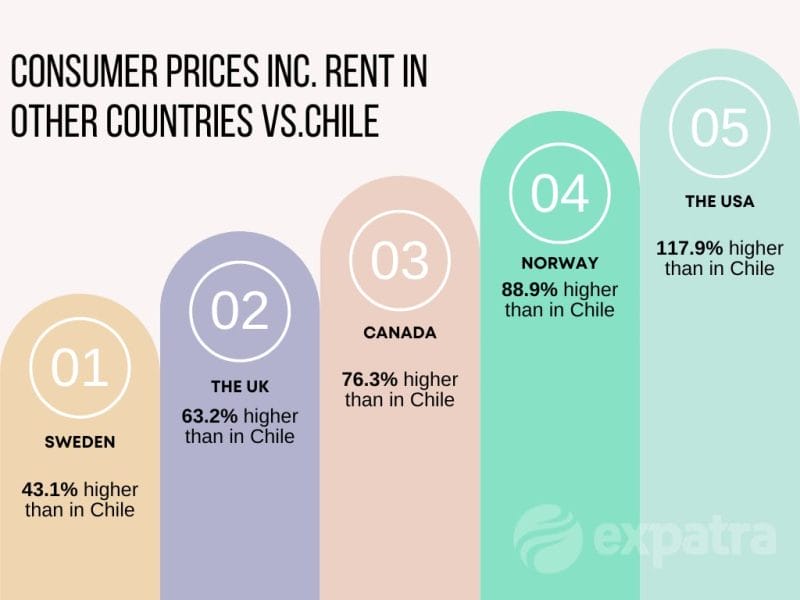
How much money you need to live a comfortable life in Chile
If you are planning to live in Santiago, you will need around $2,000 USD per couple, including rent and essentials.
It is possible to live on a budget of $1,000-1,500 USD in the cheapest areas of Chile.
However, we are speaking about the bare minimum here. To afford some comforts and treats, you need a bit more. Let’s talk about your monthly spending in detail.
Monthly expenses
Living in Chile is not super expensive, but it is not cheap either. It also highly depends on where you live. Santiago is the most expensive. There are huge differences within Santiago, too.

To simplify it, the further east-north in Santiago you live, the more expensive it gets. Assuming you will choose a comfortable but not the most expensive place to live, you would need around $1250 -1500 USD to cover the basic costs: rent, food, internet, transportation, and other living costs per person.
Rent can get expensive. A 3-bedroom apartment in the Santiago center (very busy, not as safe, but very central) will average around $900 USD, and in Providencia (nicer, safer, very centric), $1100 USD. In the fanciest parts, the rent of the same kind of apartment may cost $2000 USD or more.
The essential utilities like electricity, heating, cooling, water, and garbage can cost $135 USD. The internet is $30 USD, and a cellphone plan is $20 USD.
Buying fresh produce is cheap if you go to a local market. With $40 – 50 USD, you can fill an average shopping bag on wheels and have produce for the whole week or even two. An average cost for monthly grocery shopping per person would be around $200 – 250 USD.
A mid-range restaurant bill for two people can be around $50 USD, but you can have a full meal for $5 USD in a local eatery.
A metro and bus ticket is around $1 USD, and taxis and Uber or similar are cheap.
Traveling around the country is very reasonable if you go by bus. Trains are less common and only go to a few places. It costs double, and that is still a reasonable price.
Plane tickets are affordable, and there are many fascinating national destinations.
Here is the average cost of living in the most popular expat destinations in Chile:
| Location | Average rent | Utilities | Groceries for two | Internet | Transport |
|---|---|---|---|---|---|
| Santiago | $1000 | $150 | $300 | $50 | $40 |
| Valparaíso | $800 | $120 | $280 | $40 | $30 |
| Viña del Mar | $850 | $130 | $290 | $45 | $35 |
| Concepción | $750 | $110 | $270 | $35 | $25 |
| La Serena | $700 | $100 | $260 | $30 | $20 |
Chile as a retirement destination
You can retire to Chile, provided you qualify for a retirement visa. As the cost of living here is not that high, you can enjoy a good quality of life. Plus, Chile does not tax pensions, retirement benefits, or social security.
According to the Expatra Global Retirement Survey, Chile is in the top twenty best countries to retire worldwide.
The survey asks international retirees to rate their retirement destination’s infrastructure, climate, ease of settling down, value for money, friendliness, and other aspects of life abroad. Here’s how Chile scores:
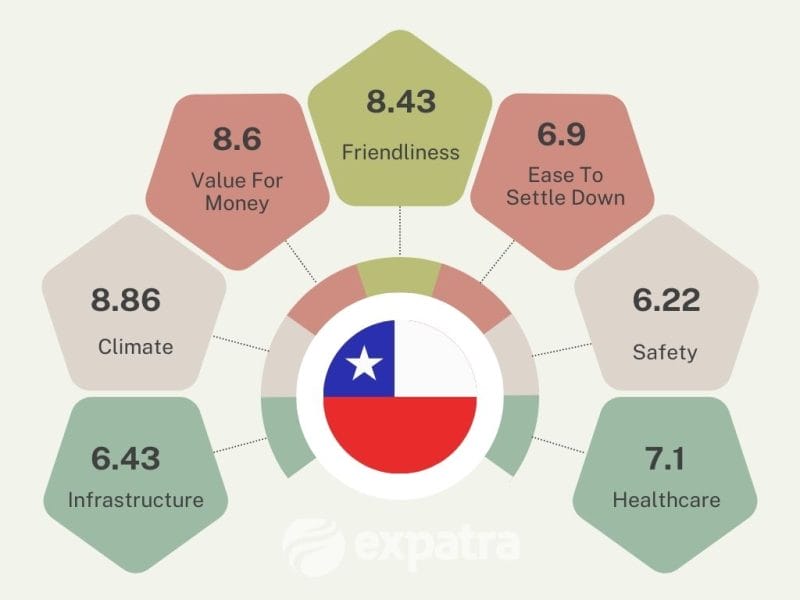
Chile retirement visa
A retirement visa is a subclass of temporary residence visas that allows you to live one year in Chile. Although it is called a retirement visa, you can still apply for a work permit if you want to work in Chile.
It might sound strange, but you do not need to be retired to apply for a retirement visa. As long as you can prove you have a source of recurring income and sufficient assets to support yourself and your family in Chile, you can qualify.
As proof, you can use your pension income, rental income, investment income, etc.
The immigration authorities require no minimum income figure. The rule is you should have enough income to support yourself and your family in your chosen area of Chile.
While there is no official income threshold, a practical guideline suggests that the primary visa applicant should demonstrate a monthly income ranging from USD 1,000 to USD 1,500, with an additional USD 500 per person accompanying them (spouse, children, or parents).
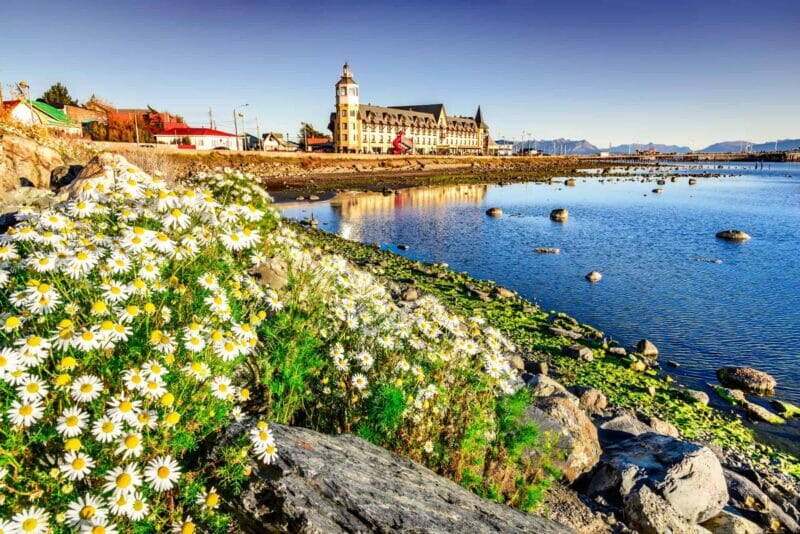
Acceptable incomes include pensions, rental income from real estate holdings, or returns from financial investments.
To apply, you will need the following documents:
- A copy of your passport
- Proof of your recurring income, aligned with your current financial situation
- Background checks from both your country of origin and your residence of the past five years
For family members:
- An original or certified copy of your marriage certificate
- Original or certified copies of your dependents’ birth certificates
- A support letter
To acquire a retirement visa in Chile, follow these steps:
- Compile all necessary documentation.
- Apply online through the immigration service’s website before your arrival in Chile, as applications for retirement visas from within the country are no longer accepted.
- Once you obtain your temporary retirement visa, you can proceed with your relocation to Chile.
- After your arrival, it is crucial to register with the civil register in Chile to obtain a Chilean ID card. Be prompt, as you have 30 days to schedule an appointment for this process.
- After two years, you can apply for permanent residency.
Healthcare
Both public and private healthcare are available in Chile for all legal residents. Here are your options:
Public healthcare
If you have a permanent residence in Chile and pay taxes, you are eligible for publicly funded healthcare, known as FONASA. In this system, you will have to pay each month 7% of your taxable income.
Foreign retirees and other expats who do not pay taxes on their foreign incomes have the option of private healthcare.
Private healthcare
Private healthcare in Chile is popular among expats due to its efficiency, quality, and English-speaking staff.
Chile’s private healthcare system is primarily composed of health insurance companies known as ISAPREs, short for “Instituciones de Salud Previsional.”
There are 13 ISAPREs in the market, with the following seven available for the general public:
- Banmédica
- Colmena Golden Cross
- Más Vida
- Vida Tres
- Cruz Blanca
- Consalud
- Ferrosalud
Subscribing to one of the ISAPREs grants access to private healthcare institutions in Chile, including clinics. Each ISAPRE offers a range of plans, allowing you to select the level of coverage that best suits your needs based on the plan you choose.
International healthcare insurance
To have coverage in several countries, some expats opt for international insurance. International health insurance can be quite expensive. To make sure you get the best value for money, compare international health insurance options from various providers to find the best deal.
Schools and education
If you are moving to Chile with children, you have several options when it comes to education and schools:
1. International schools:
International schools in Chile follow international curricula, such as the IB, American, or British systems. These schools provide an English-speaking environment and a culturally diverse community.
Most international schools are located in Santiago. Here is a list of the most popular options:
| International School | Curriculum | Average Fees |
|---|---|---|
| Santiago College | IB | $17,000/year |
| Nido de Aguilas | IB | $18,500/year |
| The Grange School | British | $15,000/year |
| Craighouse School | British | $16,500/year |
2. Private bilingual schools
Private schools are often bilingual and offer a mix of Spanish and English instruction. They are a great choice for children looking to become proficient in both languages. These schools may follow the Chilean national curriculum.
Some options include St. George’s College, Colegio Cumbres, Redland School, and The International Preparatory School.
3. Local schools
Local public and private Chilean schools are an option for expat families looking for an immersive experience in the Chilean culture and education system. Language proficiency in Spanish is essential for this choice.
International travel
Chile has several major international airports, including Santiago’s Arturo Merino Benítez International Airport (SCL), Comodoro Arturo Merino Benítez International Airport (Punta Arenas), Comodoro Arturo Merino Benítez International Airport (Iquique), and Diego Aracena International Airport (Iquique).
Santiago’s international airport offers numerous direct flights to destinations in North and South America, Europe, Asia, and Oceania.
Other international airports, such as Punta Arenas, connect to neighboring countries like Argentina.
Train travel
While Chile’s train network is not as extensive as some other countries, it does provide connections to neighboring countries, such as Argentina and Bolivia. The most famous train journey is the “Tren a las Nubes,” which connects the northern city of Salta in Argentina with San Pedro de Atacama in Chile, offering stunning scenic views.
Public transportation in Chile
Domestic flights: The two main airlines operating in Chile are LAN and Sky Airlines. Air taxis and regional airlines maintain scheduled routes to smaller destinations from Puerto Montt to Puerto Williams. However, these flights are subject to weather-related delays and typically require a minimum number of passengers (usually six) to operate.
Buses: Buses are a common mode of public transportation in Chile, serving cities and towns across the country. The leading companies are Pullman and Turbus, plus quite a few minor ones like JAC, Jet Sur, Nilahue, Cruz Del Sur, Gama Bus, and more. As Chile is a long country, when traveling large distances, choose overnight buses; they are pretty good and comfortable.
Santiago’s Transantiago network offers an extensive bus system with integrated payment options.
Metro: Santiago operates a well-developed metro system, with five lines connecting different parts of the city. Other cities like Valparaíso also have their metro systems.
Colectivos: Shared taxis known as “colectivos” provide flexible transportation in some urban areas, and they often follow set routes.
Trains: Chile’s train network is mainly focused on connecting Santiago with nearby cities. Long-distance train travel options are limited.
Ferries: Given Chile’s extensive coastline, ferries are crucial for connecting islands and remote coastal regions. For example, south of Puerto Montt, ferry services provide a slow but scenic way of traveling as far as Puerto Natales.
Taxis: Taxis are widely available in cities, and they are generally safe and reliable. Uber and other ride-sharing services are also accessible in some areas. The fare is approximately 1 USD per kilometer.
Bicycles: Many cities in Chile offer bike lanes and bike-sharing programs, making cycling a popular and eco-friendly transportation choice.
Internet
Chile has made significant advancements in terms of internet connectivity. However, do not expect good WiFi access in all locations, especially in remote in remote parts.
To access internet services at your residence, you must have a contract with a service provider, as these services are not automatically available in most locations. To set up this contract, you typically require temporary or permanent residency.
Alternatively, you can negotiate with the property owner to arrange for the connection and include the monthly cost in your rent. This can be a viable option, especially if you don’t have a RUT (tax identification number), as obtaining an internet connection without one can be challenging.
Here’s a list of major internet providers in Chile, along with their average speed and price:
- VTR:
- Average Speed: 200 Mbps
- Price: $60 per month
- Movistar:
- Average Speed: 100 Mbps
- Price: $50 per month
- Claro:
- Average Speed: 50 Mbps
- Price: $40 per month
- Entel:
- Average Speed: 60 Mbps
- Price: $45 per month
- GTD Manquehue:
- Average Speed: 120 Mbps
- Price: $55 per month
- WOM:
- Average Speed: 30 Mbps
- Price: $35 per month
Buying real estate in Chile
Land and property ownership by foreigners in Chile is generally allowed.
There are some limitations on properties near borders, coastal areas, or cultural heritage sites. Your estate agent or legal representative can provide accurate and up-to-date information regarding the property you wish to buy.
When buying real estate in Chile, here are some important things to consider:
Hire a local attorney to do a title search for you
You must hire your own legal representative to conduct a thorough title search to ensure that the property is free of any liens, encumbrances, or legal disputes.
You cannot rely on the notary or your estate agent. The notary is only responsible for the legalization and registration of the purchase contract, and the estate agent isn’t qualified to conduct a title search.
It’s a complex procedure, and you need professional help. You won’t find all the necessary information in the land register. Sometimes, a deep background check going back as far as 30 tears is required. Also, there are different land registers for property rights and water rights.
Your attorney must make sure you are not buying a property with a lien or mortgage in place without you being aware of it.
Your attorney can also perform due diligence on the property, including verifying zoning regulations, permits, and any potential limitations.
Hire a surveyor
It is also advisable to hire a structural surveyor. In Chile, there is no legal mandate compelling property sellers to disclose structural defects to buyers, which means you might remain unaware of any potential issues until after the property transaction has been completed.
Taxes and fees
When it comes to property taxes and fees in Chile, it’s important to note that they may vary depending on the location and other factors. Here are some common taxes and fees associated with real estate in Chile:
- Property Transfer Tax: This tax is usually around 1.2% of the property’s value and is paid by the buyer upon the transfer of ownership.
- Property Registration Fee: There is a fee for registering the property with the Chilean Public Registry, which is typically a small percentage of the property’s value.
- Notary Fees: Notary fees are charged for the preparation and notarization of documents related to the purchase. The cost can vary based on the complexity of the transaction.
- Real Estate Agent Fees: The fees for real estate agents in Chile can vary, usually around 2-3% of the property’s value, and are typically paid by the seller.
- Property Tax: Property owners in Chile are subject to an annual property tax known as “Contribuciones.” The amount is calculated based on the property’s assessed value and can vary depending on the municipality.
Where to live in Chile
In Santiago, most expats are concentrated in a few communes: Santiago Center or Ñuñoa for the lower-priced neighborhoods, and Providencia, Vitacura, and Las Condes for a higher standard of living.
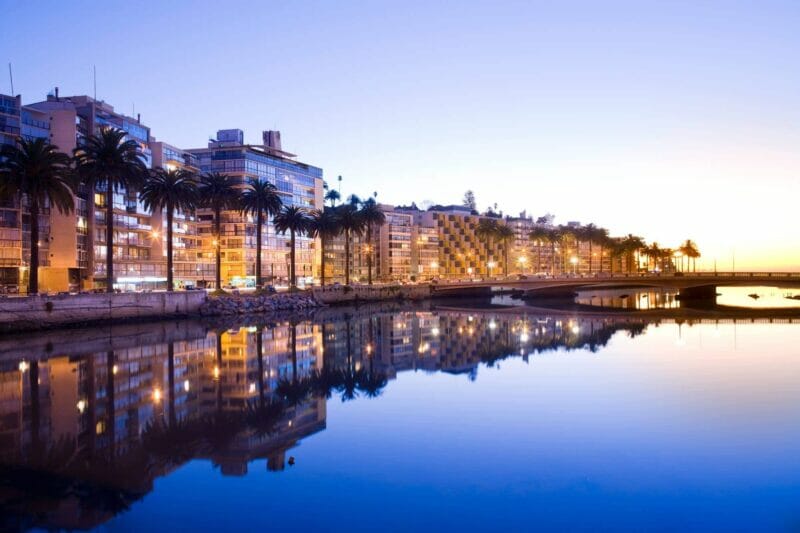
When renting an apartment as a foreigner, you must prove your financial status. It is hard to come by rent for less than one year. If you want to stay for a short stay, furnished apartments or shared apartments will be easier to accommodate this request.
You can find more details about Chile’s capital and expat life here in our Living In Santiago guide.
Out of Santiago, there are a few favorite places among the foreigners: Viña del Mar or Valparaiso, 90 minutes drive from Santiago, on the beach, with all the advantages of a big city, and fewer downsides of one. In summer, it gets crowded, though.
A 6-hour drive north of Santiago, La Serena is becoming an international hub. It is located on the beach with mild weather and in the vicinity of the beautiful Valle del Elqui (Elqui Valley).
Consider Valdivia and Pucón, or neighboring towns in the south, if you want a cooler climate and very close to nature.
Here is a list of the most popular locations for expats with climate descriptions and an average property price:
| Expat Location | Climate | Average Property Price (USD) |
|---|---|---|
| Santiago | Warm Mediterranean | $320,000 |
| Valparaíso | Mild Mediterranean | $280,000 |
| Viña del Mar | Mild Mediterranean | $340,000 |
| Concepción | Oceanic | $220,000 |
| La Serena | Arid Mediterranean | $260,000 |
| Antofagasta | Arid | $240,000 |
| Temuco | Oceanic | $200,000 |
| Puerto Varas | Cool Oceanic | $300,000 |
You will find more information on where to live in Chile in our Best Places To Live In Chile guide.
The pros of living in Chile
1. It’s safe
Chile and Uruguay are the safest countries in the Latin-American region. Still, they might seem dangerous coming from other parts of the world. You do need to know where you can go and which areas you should avoid.
You will definitely hear about robberies in the news or from friends. However, I have lived here for 11 years and haven’t even experienced pickpocketing.
2. Nature and the great outdoors
Urban tourism might not be Chilean strength, but nature in Chile is simply amazing.

Chile is a large country with a relatively small population, so the countryside is vast. Whatever you are into, you can find it here: desert, forest, glaciers, lakes, ocean, rivers, vineyards, hiking, skiing, surfing, swimming, rafting, biking, etc.
3. Easy-going and friendly people
Chileans are very friendly and hospitable (even more if you are in the countryside). They are lively and like to celebrate everything and anything.
Remember one thing: no social commitment is ever 100% fixed. If a better plan comes up, Chileans will change their mind and not show up to the party they said yes to before. Sometimes they will not even let you know. Nobody gets offended, so you shouldn’t, either.
4. Women in power
Compared to other Latin American countries, Chile is much less sexist. Chile already had a female president twice (Michele Bachelet both times), and many women occupy high posts in the government and public institutions. Women have a lot of say in Chilean families, public institutions, and private companies.
5. Technologically advanced cities
Urban Chile is all about the internet. We have 5G, many public institutions work entirely online (no paper forms), and eCommerce in Chile works very well. Tech innovation is highly valued and endorsed by various government programs.
6. Good wine
If you are into wine, Chile has a lot to offer. There are a lot of wineries here, mainly in the Central Valley. But even in southern Chile, you can enjoy a wine-tasting session or a vineyard tour.
It’s possible to buy good wine in almost any supermarket for an excellent price.
The cons of living in Chile
1. Slow visa process
In the last decade, immigration to Chile rose substantially, but the Immigration office did not adapt much. Unfortunately, you might be waiting for your visa for months or even more than a year. It is tough, if not impossible, to get anyone on the phone and get information on your visa status.
2. Nothing is on time
If you are an “on time” person, you have a lot of getting-used-to ahead. Almost nothing is ever on time.

When invited to your first Chilean party, you might show up first. The host might not even be at home yet, or they may be taking a shower (talking from experience).
Parties start much later than they invite you (like 2 hours late).
Even work meetings, conferences, concerts, plays, and performances may start late. It was a pleasant surprise when I realized the trains usually run on time.
3. Poor quality service
You might find that Chilean companies don’t offer good service unless it’s an expensive luxury product or service. Sometimes, you might get a feeling that they don’t really want to sell the product or service because if they wanted to, they would at least make an effort.
4. Mostly bland food
Chilean food is not world-renowned, and it is for a good reason: most Chilean food is not very interesting.
The most used spice is oregano; other herbs rarely get used. Despite Chile’s name reminding of chile peppers, the food is rarely spicy. They only use a few spicy sauces like “ají” and “pebre“.
The big exception is seafood. The seafood dishes are delicious. Beware when you have Chilean seafood for the first time: it may contain a type of bacteria you haven’t been exposed to before that can give you so-called “chilenitis,” a stomach bug that manifests as acute diarrhea.
If you are a meat lover, you’ll love it here. Chileans are huge fans of BBQ, called “asado,” and celebrate anything and everything with one.
Things to know before moving to Chile
You must first understand that Santiago de Chile, the capital, differs greatly from the rest of the country. It might even seem that Santiago is its own country.

Santiago is a modern and vibrant city with all modern amenities. It’s very multicultural, which is brilliant if you love dining out – restaurants here offer cuisine from every part of the world.
But it is also full of people and cranky drivers, it’s polluted, and compared to Europe or the US, it can be dangerous.
The city is divided into “comunas” (communes).” Some comunas are safe and wealthy, while others are impoverished and unsafe.
The “other” Chile might seem poor, disconnected, and a bit out-of-date. There is much less employment. Still, people are amicable and helpful, and nature is breathtaking. The atmosphere is very relaxed compared to the Santiago rush and stress.
Imagine living with no mobile connection or internet – this is what you can get in rural parts of Chile.
While living in a smaller city, I had to renew my expired driving license. The whole experience was like time travel: I had to fill out the forms by hand, and they took my picture with an old-fashioned camera, printed it, and glued it to the permit.
The final thoughts on living in Chile
If you are nature-loving and relatively relaxed or adaptable, you will find living in Chile attractive.
Whether you are planning to explore entrepreneurship and business opportunities or enjoy tranquil living in the slow-paced countryside, Chile may be just the place for you. Come without big expectations, and Chile will surprise you!
You might find useful:
- The 9 Best Places To Live In Chile For Expats
- Living In Chile As An Expat – The Essential Guide
- Didn’t find what you were looking for? Comment with your question below, and we’ll do our best to help.
Helpful external links:
- Obtaining RUT – the government site.
- Find a local doctor – the government healthcare website
- Entry and exit Requirements for U.S. citizens – cl.usembassy.gov.
- Information for British citizens moving to or living in Chile – uk.gov.
- List of medical facilities/practitioners in Chile – uk.gov
6 comments
Tess
I need to have a good divorce lawyer that doesn’t cost a fortune. Any recommendations, please 🙏
Nicole Miller
Hi. We are looking to travel and live abroad with my 10 year old son. We are very successful in real estate here in Florida. We love nature and really want to slow down and enjoy our time together. My son has been homeschooled for 4 years so we are accustomed to that lifestyle. I speak almost fluent Spanish which will be helpful in getting around. With all of the crime in Mexico, that option has moved to a less desirable area. So we are looking at other options.
Lenka
Hi Nicole,
Chile is a wonderful place if you love nature and want to slow down! There are so many beautiful places here. You can pick your favorite climate and find a nice smaller place for your family. Smaller areas will be better for quiet life near nature. But if you love city life, there are cities that have great access to nature all around.
Let me know what your preferences are and I can suggest a region. You can also read abut different locations here: https://expatra.com/guides/chile/best-places-to-live-in-chile/
Lenka
Adel
Hi Lenka,
Do you know any community who are open to have volunteers for sustainable living, gardening, or for restoration projects? I’m looking for opportunities in Chile. I have a permaculture designer certificate, if that matters.
Thanks so much,
Adel
Lenka Babarikova
Hi Bonita,
Arica is one of the cities I would have recommended if it wasn’t for the current immigration crisis in the north part of Chile. Should the crisis end, it could be a great place to retire.
It is a tranquil town, known as the “town of the eternal spring”, with warm weather, nice waves for surfers, amazing nature around, and slow-paced life.
Bonita marie Smith
What about Arica.
Thank you. I am looking for a slower pace in retirement, good warm weather.
Bonita